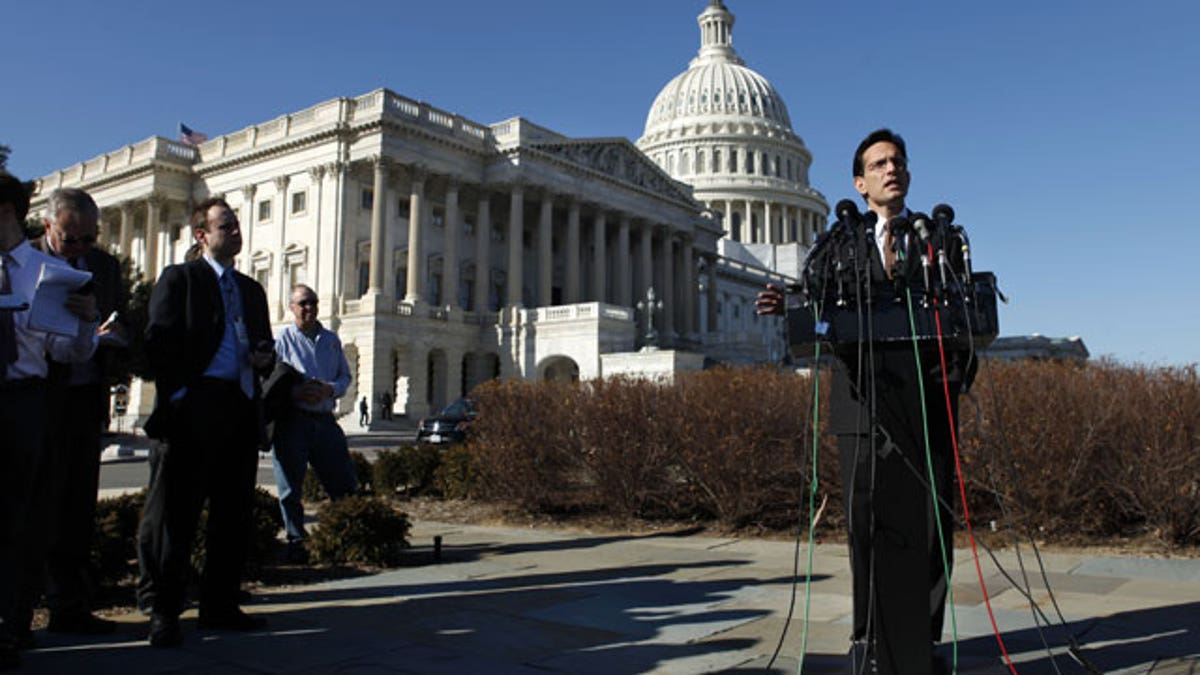
January 31, 2012: House Majority Leader Eric Cantor of Va., speaks during a news conference on Capitol Hill in Washington to discuss the Stop Trading on Congressional Knowledge Act, or STOCK Act. (AP)
WASHINGTON – The House is ready to pass a Republican bill to ban federal officials from insider trading, legislation that was heavily influenced by Wall Street firms that want to avoid new public disclosure rules.
Democrats complained the bill was gutted when Republicans dropped a requirement that people who collect information from Congress -- and sell it to investment firms -- should register like lobbyists. They also would have to file public reports on their activities. The Senate's version of the bill included the registration and disclosure provisions.
Despite their misgivings, key Democrats said before the vote Thursday that they would join majority Republicans in voting for the bill, and demand a House-Senate conference to restore the Senate-passed disclosure rules. The Senate bill passed, 96-3, last week.
Congress looked at itself in a mirror after CBS' "60 Minutes" reported last November that some lawmakers were enriching themselves based on nonpublic information they learned from their official duties.
Under the Republican bill, financial transactions of those covered -- in Congress and the executive branch -- would have to be publicly posted online, either 30 days after notification of a transaction or 45 days after the transaction.
Rep. Louise Slaughter, D-N.Y., who has been trying to get an insider trading bill passed for six years, said she supported the GOP legislation even though "I'm greatly concerned that this bill ... doesn't regulate the growing political intelligence industry" that wants to profit from contacts with lawmakers and their staffs.
The measure also won House Democratic Leader Nancy Pelosi's endorsement Wednesday. The former speaker said she supports a provision aimed directly at banning lawmakers from using their positions to gain special access to initial public offerings of stock. The CBS show questioned an investment in an initial public offering of Visa stock by Pelosi's husband in 2008 at a time when legislation to rein in credit card fees was before the House. Pelosi said she did nothing wrong, and the investment was unrelated to the bill.
The harshest criticism of the Republican bill, however, came from Republican Sen. Charles Grassley of Iowa -- who sponsored the Senate amendment favoring more disclosure.
"It's astonishing and extremely disappointing that the House would fulfill Wall Street's wishes by killing this provision," Grassley said. "The Senate clearly voted to try to shed light on an industry that's behind the scenes. If the Senate language is too broad, as opponents say, why not propose a solution instead of scrapping the provision altogether?"
Presidential spokesman Jay Carney complained Wednesday the bill "was being weakened behind closed doors" at the behest of Wall Street lobbyists. However, President Barack Obama said he would sign it.
The bill is entitled the STOCK Act, which stands for Stop Trading on Congressional Knowledge.
The growing political intelligence industry lobbied hard to get the House Republicans to modify the Senate's plan or eliminate it. House Majority Leader Eric Cantor, R-Va., substituted a congressional study of these firms -- essentially taking no action.
Laena Fallon, a spokeswoman for Cantor, said the Senate provision could violate First Amendment rights of individuals who have nothing to do with gathering information for investors. "This provision was extremely broad and its impact would have raised more questions than it answered," she said.
Fallon said the bill is broad enough to cover real estate transactions and other types of investments -- basically, any investment based on nonpublic knowledge learned through one's official duties.
The House bill also would prevent lawmakers convicted of a felony from collecting their government pensions. It includes a long list of felonies that would trigger loss of the benefits, including bribery, fraud and perjury.
The Office of Government Ethics, the ethics watchdog for the executive branch, said about 28,000 high-level employees file annual, public financial disclosures of their holdings and liabilities.
Members of Congress and their staffs already face the same penalties as other investors who attempt insider trading, though no member of Congress in recent memory has been charged with that offense.
In 2005, the Securities and Exchange Commission and Justice Department investigated then-Senate Majority Leader Bill Frist's sale of stock in his family's hospital company, but no charges were brought against the Tennessee Republican.




